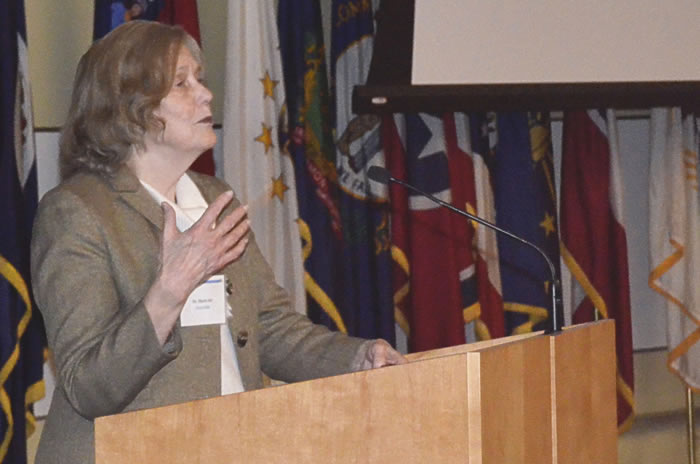Biomedical Research Workshop Enhances Scientific Collaboration in Support of the Warfighter

The Integrative and Collaborative Biomedical Research for the 21st Century Workshop was held Nov. 29-30 at the Fort Detrick Auditorium. Presented by the U.S. Army Medical Research and Materiel Command's Systems Biology Collaboration Center (SBCC) within U.S. Army Center for Environmental Health Research (USACEHR), the workshop featured presentations by representatives from USAMRMC laboratories as well as other Department of Defense organizations. More than 100 people attended the 2-day event.
In addition, demonstrations were conducted to show how USAMRMC capabilities could be used in collaborative studies to accelerate research efforts. Capability demonstrations included USAMRMC's SysBioCube, Biotechnology High Performance Computing Software Applications Institute's 2B-Alert Smartphone App, and USACEHR Integrative Systems Biology Program's PanoromiX and Functional Heatmap web applications.
At the end of the workshop, a panel discussion focused on "The Way Forward for 21st Century Scientific Methods in the Department of Defense." Dr. George Ludwig, Principal Assistant for Research and Technology, USAMRMC; Dr. William Mattes, Director, Division of Systems Biology, National Center for Toxicological Research, U.S. Food and Drug Administration; Dr. J. Ben Petro, Acting Director, Office of the Under Secretary of Defense, Research and Engineering; and Maj. Jonathan Stallings, Acting Director, Office of Regulated Activities, USAMRMC addressed audience questions and discussed the future path.
Addressing future opportunities, Stallings stated, "As much work as we do on the advanced development side, the greatest opportunity we have right now is to get better engaged before projects head over to advanced development."
The workshop incorporated scientific presentations and brainstorm sessions that encouraged networking and will enhance scientific collaboration in support of the Warfighter. "This is just the starting point," said Dr. Valerie Trabosh Divito, Acting Director of USACEHR's Systems Biology Collaboration Center. "We have discussed many ways to build collaboration and ways to overcome barriers. It's all about communication, taking it to the next level, and understanding how we can make the systems biology approach work in developing capabilities for our Warfighters."
 An official website of the United States government
An official website of the United States government
 ) or https:// means you've safely connected to the .mil website. Share sensitive information only on official, secure websites.
) or https:// means you've safely connected to the .mil website. Share sensitive information only on official, secure websites.


